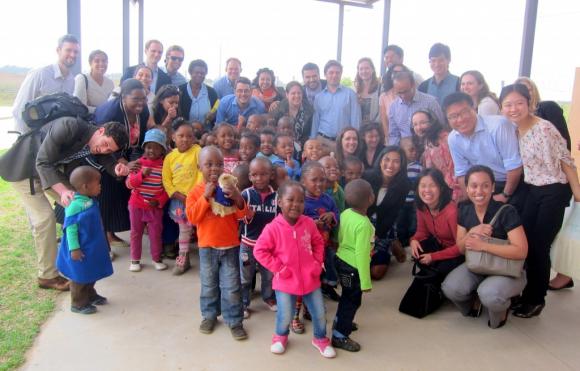South Africa: Land of Contrasts... and Hope
Though “land of contrasts” is a common description of both Africa as a continent and South Africa in particular, in retrospect, I don’t think it is possible to fully grasp the full import of that statement until you experience it yourself. At least, during the remainder of my International Experience there, the nonchalant juxtaposition of contrasts in natural beauty, modernity and quality of life—among other areas—provoked a sort of psychological whiplash on a daily basis.

For example, during the five or so days that we spent in Cape Town, we visited the Cape of Good Hope and Table Mountain. Atop the latter, as I watched clouds spill over one of the mountain’s lesser peaks and the sun meet the moon during its glorious descent at dusk, I had no doubt that Table Mountain deserved its title as one of the seven natural wonders of the world. Yet, only a few minutes drive away, rays from the same sun bounced erratically off of the corrugated tin roofs of the city’s shanty towns, where layers of fresh and not-so-fresh garbage mixed with the brown soil to comprise the backyards where children play. Looking out the car window, I could not help but blink twice. The same effect played out during our company visits. In Johannesburg, as we met with the head of HR at Kumba Iron Ore, voted to be one of the best employers in South Africa, I found myself impressed by an incredible talent management strategy: a clear and robust performance management system, structured opportunities for professional development and a holistic view of the employees that meant, in certain cases, going as far as providing new housing for them and their families. As we discussed these programs, even though they were oceans and industries apart, these HR conversations evoked flashbacks to some of the beacons of HR that are more familiar to me in the States, such as SAS and Google. Given the sophistication and resources behind Kumba’s strategy, I could easily close my eyes and imagine that I was speaking with one of the heads of HR at one of these other companies. At the same time, however, the realities of a country with the highest Gini coefficient (which is a measure of income inequality) mean that giants of industry like Kumba are de facto neighbors to budding entrepreneurs operating at the opposite end of the spectrum. In our tour with Asha Trust in the Soweto neighborhood of Johannesburg, we met an up-and-coming crèche-owner whose six youngest charges were apparently having naptime nearly on top of one another in a windowless room the size of my bathroom in New Haven. Her ultimate goal, the crèche-owner explained, was to move elsewhere and convert the remainder of her Soweto house into more rooms for her charges. That said, in the meantime, the four- and five-year-old’s seemed to me to be miraculously content with being up close and personal—their potential alternative being getting left to wander the streets of Soweto alone during the day while their parents were at work.

One theme that did not vary in this land of contrasts, however, was the hope and pride with which South Africans viewed their country. While they acknowledged the issues of education, HIV and unemployment that beleaguered South Africa, big business leaders, entrepreneurs and laypeople alike spoke with excitement about the future of their country and the example it would set for the rest of the continent. Case in point: On one of my last days in Cape Town, the waiter at our hotel—whom I had befriended during our stay—asked me when, not if, I would be coming back. When I asked how he knew I would be coming back at all, he replied knowingly, “Oh, this is a beautiful country, and many good things are happening here. You will be back.”


